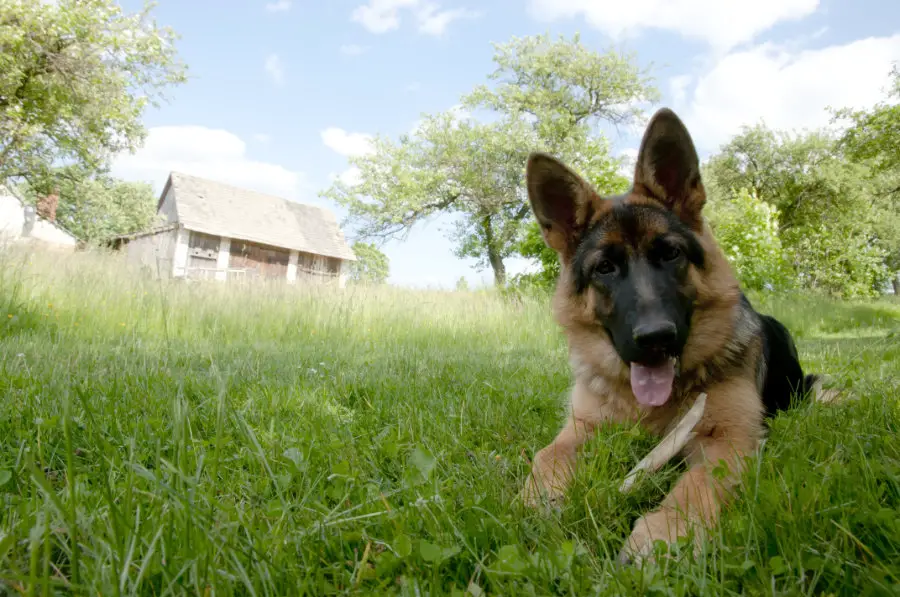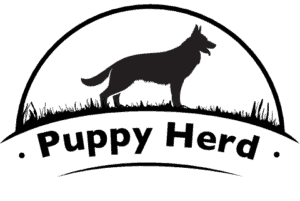You love your pets, and your loyal dog companion loves nothing more than to chew a hearty bone. You may be thinking that it is a natural thing, think again.
German Shepherds cannot eat chicken bones, either raw or cooked, at any stage. Chicken bones may cause obstructions, perforations, lacerations, and are a choking hazard. Raw bones also contain bacteria such as Salmonella and can make both you and your pet ill.
If you insist on bones in your German Shepherd’s diet, you should take the safer route of raw ground bones as part of a raw food diet. If you are wondering why bones are bad for them, we have provided you with some sobering facts behind just giving your dog a bone.

Are Bones Bad For Your German Shepherd?
Your dog should not eat chicken bones, any kind of cooked bones, or whole bones of any kind. Vets firmly state that raw poultry and pork bones, as well as any cooked bones, should not be allowed in their diet.
The Federal Drug Administration went so far as to release a statement to that effect due to the abundance of bone-related ingestion injuries and fatalities in dogs due to bone consumption.
The complaints of bone treat related injuries were sustained by products marketed as treats for dogs such as:
- Ham bones
- Pork femur bones
- Rib bones
- Smokey knuckle bones
The list of injuries was vast and resulted in fifteen deaths of canines between 2010-2017. This figure only reflects the complaints lodged with the FDA, and the figures are presumed to be exponentially higher. Other injuries included:
- Blockages in the digestive tract
- Choking
- Rectal bleeding
- Cuts and wound in the mouth
- Vomiting
- Diarrhea
- Death
Why Are Chicken Bones Bad For Your German Shepherd?
A common question from dog owners is why bones are bad for dogs when they have been feeding on them for years. With the success of the human primal diet trends, many dog owners have claimed that it is natural for dogs to feed on raw bones. Our dog’s ancestors ate bones to access the nutritious marrow contained within the bones and hence developed strong jaws.
Generally, chicken bones will dissolve in your dog’s stomach, and most of the time, there will be no ill result. It just begs the question, what if the bones do not dissolve, and they suffer intestinal damage? Is the pleasure of a bone and its potential hazards worth the risk?
Potential Effects Of Bone Consumption
- Obstructions: Although cooked bones may appear softer than raw bones, some bones can be relatively large compared to your dog’s throat. If they attempt to swallow a bone such as a thigh bone, it may become lodged in the throat or esophagus, causing them to choke, retch and drool. If the bone becomes lodged in their throat or pharynx, it may obstruct their airway and cause difficulty breathing and choking.
- Tearing of the gastrointestinal tract: In general, chicken bones and bones may splinter and form sharp edges that can tear your pet’s vulnerable digestive system. Sharp bone splinters in your dog’s digestive system may require a hospital stay, anesthetic, sedation, enemas, intravenous fluids, and x-rays and even surgery.
- Bacterial contamination: Clinical studies have concluded that there are bacteria present in raw animal food products that are harmful both to pets and their owners. Uncooked bones may often contain Salmonella Bacterium, causing salmonellosis in dogs and transmitted to humans due to the bacterium’s zoonotic nature.
Do Bones Provide Any Real Nutritional Value?
An article by PetMD, suggests there’s no need for bones in a dog’s diet, and it claims bones provide very little real nutritional value. As much as 65%-70% of a bone is composed of nothing but calcium, phosphorus, oxygen, and hydrogen. There are no real vitamins, fatty acids, proteins, or carbohydrates to provide any substantial nutrition.
The 30% collagen found paper pound in bone is poorly digested by the canine system and offers no substantial health benefits. So, the health aspects of your dog eating bone are negligible and hardly worth the potentially harmful consequences. Although the marrow in bones provides an evolutionary advantage for dogs in low prey conditions, dogs may be fed marrow in their food without the potential harm inherent in the bone itself.
What About Feeding My German Shepard Ground Bone?
You may give your dog raw bones that are safely ground up to eliminate sharp edges and choking hazards. To maintain a proper phosphorus and calcium level, you should consult your vet when choosing your raw food to ensure balanced ratios. An excess of phosphorus can cause damage to their renal system.
Advantages Of A Ground Bone Diet
- A properly balanced raw meal containing raw bones once or twice a week provides your dog with calcium and phosphorus that are beneficial to their health.
- BARF (Biologically Appropriate Raw Food) promotes the fiber-like aspects of the ground bone that help with scooting conditions and clear the canine’s anal sacs. Scooting is the process where your pet may drag its hindquarters across the floor due to the discomfort from uncleared residue in the anal sacs.
Disadvantages Of A Ground Bone Diet
- An all-ground bone diet does not provide sufficient nutrition.
- Raw ground food may contain pathogens harmful to humans and pets.
What Other Options Can I Give My Dog To Chew?
If you have decided that dog bones such as chicken are not worth risking your German Shepherd’s health, there are safe alternatives for them to chew on. Dense rubber treats or woven fiber dog chewing toys can give your pet a chewing outlet, without the associated dangers of a bone.
You can keep your dog’s teeth healthy by brushing them daily or give them specially designed chew treats and dental sticks. Wherever you can, find chew treats and toys approved by the Veterinary Oral Health Council (VOHC).

What If My German Shepard Has Stolen Chicken Bones?
If your pet has swallowed chicken bones without your intention, keep calm, and don’t panic. Often, dogs may safely pass chicken bones through their system without consequence. However, you should monitor them and seek immediate veterinary care if they exhibit the following signs:
- Poor appetite
- Vomiting
- Diarrhea
- Lethargy
- Drooling
- Coughing
- Retching or gagging
- Difficulty breathing
If your dog looks happy and healthy, keep an eye out for any behavioral changes for a day or two until they have passed the bones.
Keep Your Dog Safe From Table Scraps
Ensure that your bins have secure lids and that you never leave exposed scraps or meat where your dog might reach. Store bone scarps away from their access at all times and ensure that visitors to your home are aware of your no-bones policy.
Final Thoughts
Your pet is a much-loved part of your family, and you should not put your pet in harm’s way unnecessarily. The nutritional benefits of bones don’t justify the risks, even if bones are considered a canine’s natural fare. Your pet might have eaten bones regularly without consequence, but it only takes one wrong swallow, and it could turn into an unfortunate event and costly Vet visit.
Sources
- FDA: No Bones (or Bone Treats) About It: Reasons Not to Give Your Dog Bones
- Pet MD: What Do I Do If My Dog Ate a Chicken Bone?
- PetMD: Dogs and Bones: a Dangerous Combination
- Pet MD: Can Dogs Eat Bones? Raw & Cooked Bones for Dogs
- Pet MD: How to Use Bones in a Dog’s Raw Food Diet
- Vet Record: Occurrence of Salmonella, Campylobacter, Clostridium, and Enterobacteriaceae in raw meat-based diets for dogs
- NCBI: Preliminary assessment of the risk of Salmonella infection in dogs fed raw chicken diets
- Pet MD: The Nutritional Aspects of Bone Composition
